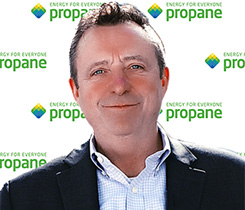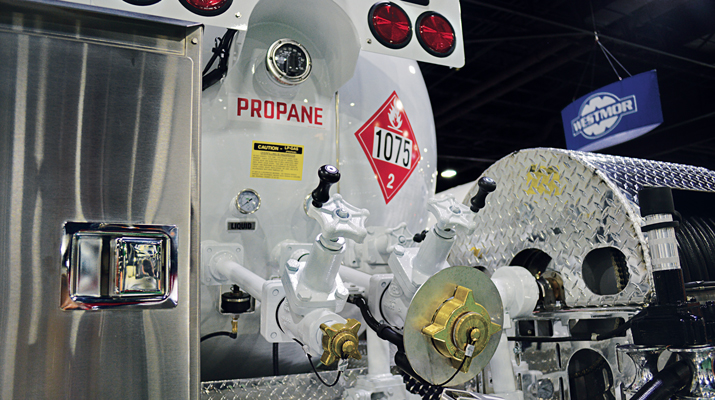Forklift maintenance and training program gets high grades
A Cincinnati classroom of veteran forklift users begins a daylong training session with a 20-question test to measure their knowledge about maintaining and repairing propane-powered forklift fuel systems. Among the questions:
The maximum allowable U.S. OSHA concentration for continuous carbon monoxide exposure in any eight-hour period, according to federal law, is _______.
- 9 PPM
- 50 PPM
- 200 PPM
- 400 PPM
What might cause a 3% to 8% carbon monoxide emission?
- Incorrect ignition timing
- Restricted fuel return line
- Defective air or coolant sensors
- All of these
Propane operates at a ______ air/fuel mixture than gasoline.
- Richer, 14.7:1, 13.5:1
- Leaner, 14.7:1, 15.5:1
- Richer, 15.5:1, 14.7:1
- Leaner, 13.5:1, 14.7:1
To achieve a mixture with maximum power with the lowest possible emissions, the mixture should be set when:
- The engine is under full load and the manifold vacuum is below 3″ Hg
- The engine is at idle
- The engine is at part-load
- The engine is at full load and the manifold vacuum is above 10″ Hg
“OK, pencils down,” instructor William McGlinchey tells his 23 students. He later reports the cumulative test score at 57 percent.
Businesses that operate the large Class 4 and 5 large spark ignition (LSI) forklifts are being pressed to comply with ever-tougher federal and local indoor air quality standards. Eighty percent of those are propane-fueled lift trucks because they offer superior performance and cost savings in addition to low tailpipe emissions.
 |
Those advantages begin to erode without proper maintenance and adjustments to the fuel system, however. High carbon monoxide levels in forklift exhaust not only endanger workers health, they signal poor fuel use, McGlinchey tells his students. Proper tuning of a propane engine improves fuel consumption and lowers operating costs while safeguarding the health of workers in the nation’s busy factories and warehouses.
The first step in achieving those goals is to learn the lessons of a propane engine. The Forklift Technician Maintenance & Training Program trains technicians and forklift users nationwide in the proper steps to achieve optimum indoor air quality and engine performance.
The lesson
The college class-like setting starts with a review of technical issues and specifications to explain the different fuels and what’s going on inside a forklift engine. Students appear versed – but not expert – as the instructor reviews the chemistry and physics lessons at play during an engine tune-up. McGlinchey also explains the evolution of the engine technology and its limitations.
 |
Each student is then provided a new, four-gas exhaust analyzer to measure truck performance and determine the problems and solutions based on those sensor readings.
“It’s amazing how much you can tell what a tune-up will do just by looking at the air/fuel ratio,” instructor Bryan Memmott of Woodward Controls tells students.
A handful of questions and answers later, the class seems to grasp the concepts.
“Now let’s take that information from the class and put the rubber to the road,” McGlinchey says.
At 2 p.m., the class breaks into teams and heads to the adjoining shop area to apply the lessons to real truck engines. Awaiting them are five propane-fueled forklifts representing three engine types (Nissan, GM, Hercules). All have Impco fuel conversion equipment, and all are in need of some sort of performance tinkering.
Using their new analyzers, each team carefully measures emission gas levels at idle, maximum RPM, with full and partial loads, and during engine stalling and truck tilting. Their findings are recorded and discussed among team members, although the revving from the five vehicles makes it tough to hear all the dialog. Each group then performs the adjustments recommended by the team and measures results.
Both McGlinchey and Memmott circulate between the teams to observe their methodology, listen to their dialog and answer questions.
By late afternoon, students return to the classroom to discuss the results and review their chosen maintenance approach. What worked and why?
At day’s end, the class repeats the test. The class score zooms to 91 percent.
“It’s a whole lot simpler the second time,” he acknowledges.
Promising pilot
Last year, similar classes were held in California, Illinois and Texas. Pre- and post-tests were administered to all attendees to assess training effectiveness. According to McGlinchey, the average test score improved by 51 percent upon course completion.
 |
The success of that six-city pilot program led to a $195,000 Propane Education & Research Council grant this spring that adds 20 classes starting this summer. The sessions feature an all-new forklift and industrial engine propane fuel systems training manual, NFPA Code 58, an examination of issues specific to various manufacturers’ specifications, and EPA and CARB emissions regulations.
The project, a joint venture of the Propane Vehicle Council and PERC, targets businesses with large fleets and forklift distributors with maintenance staffs, as well as propane dealers and distributors.
“This program has great potential. We estimate that at a minimum 200 to 300 companies will secure training during the first year, which potentially translates into the improved maintenance and performance of between 5,000-10,000 forklifts,” says McGlinchey. co-developer of the program curriculum and president of AFV Consulting in Morgantown, W.Va. Previously, he was facility manager for the National Alternative Fuels Training Consortium at West Virginia University.
Designed for pre-2002 open-loop forklift models, the one-day course features a training manual consisting of six chapters covering health and safety, properties of propane, propane tanks, fuel system components, maintenance and repair, and exhaust emission testing.
 A team of students learning to optimize fuel efficiency and power take their class lessons into the shop at the Forklift Technician Maintenance & Training Program held in Cincinnati last October. |
Every participant also gets the new gas analyzer, a reference of current and past propane fuel system specifications and a seven-step job aid for diagnosing and repairing conventional open-loop technology.
At the conclusion of the course, students should be able to:
- Identify the health signs of air
- Evaluate the fuel systems and choose tanks, lines, hoses, valves and fittings in accordance with NFPA 58
- Perform systematic diagnostic and troubleshooting procedures
- Perform scheduled maintenance and component repairs
- Understand combustion chemistry and exhaust emissions
- Use exhaust emissions to diagnose fuel systems performance
- Adjust air fuel mixtures for optimum performance and minimum pollutants
- Differentiate between ambient air and tail pipe emissions
- Determine the proper compliance needed for various emission standards
“This program provides forklift maintenance personnel with the information they need to reduce emissions, thereby saving on fuel costs and increasing efficiency of their forklift. But the program’s emphasis on maintenance and repair is also important for forklift dealership technicians, because the dealerships can reduce their operating costs if they focus more on proper repair and maintenance rather than replacing parts at every instance,” says Brian Feehan, executive director of the Propane Vehicle Council.
About 640 million gallons of propane fuel 500,000 propane forklifts nationwide each year. While that represents a healthy share of the 1.3 million forklift trucks in operation, improvements from the competition and toughening indoor air quality standards are threatening a market that accounts for about 13.5 percent of the total propane consumption in the United States, Feehan explains.
“The propane industry understands that there is a clear need for a fresh approach to forklift fuel system maintenance and repair, and technician training. The propane industry is pleased to bring our successfully demonstrated approach to provide forklift maintenance personnel with the information they need to reduce emissions, save on fuel costs, and increase efficiency of their propane-powered forklifts,” he says.
Beyond the propane industry, the Industrial Truck Association and the Material Handling Equipment Distributor’s Association are promoting the program.
The first of the 20 additional classes was held June 22 in Atlanta. Others already scheduled for this year will be held July 13 in Houston, Texas; July 15 in Dallas/Ft. Worth, Texas; Aug. 4 in Sacramento, Calif.; and Aug. 10 in Cerritos, Calif.
For more information, contact the Propane Vehicle at 202-530-0479.
















